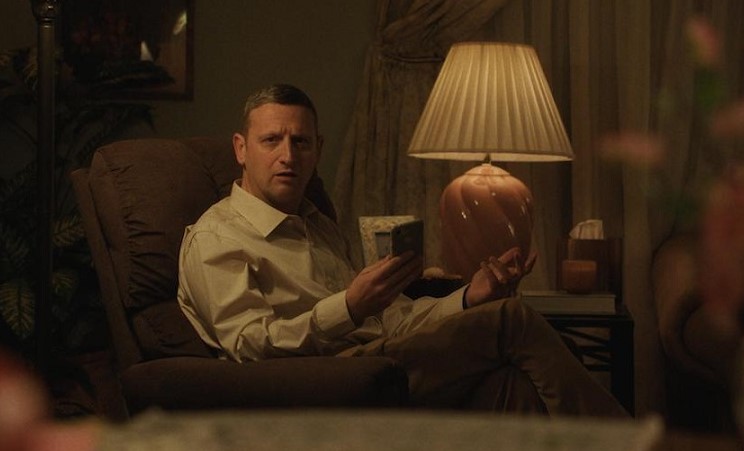
Running Time: 97 minutes
This feature from A24 opens exclusively at theaters in various markets on May 16th and expands further on May 23rd.
Sometimes you see a film that you immediately know won’t be for everyone. The new A24 comedy Friendship is one of those titles. Its protagonist can’t seem to do anything right and often makes the worst possible choice in a given situation. Such individuals can be frustrating to watch, and this reviewer will admit to feeling this way during several parts of the picture. And then, events became so surreal and uncomfortable that its dark, absurdist tone became amusing. As comedies go, this isn’t a pleasant experience, nor is designed to make you feel joy. Yet it does deliver memorably peculiar moments as it bluntly examines desperation and artificiality in building and maintaining relationships.

Craig Waterman (Tim Robinson) is a suburban dad struggling to connect with his family. His marital relationship is strained, with his cancer survivor wife Tami (Kate Mara) spending as much time with her old boyfriend as her spouse. It isn’t much better with son Steven (Jack Dylan Grazer), who appears to get on excessively well with his mother. Clearly, Craig has his own problems, to the point where awkward interactions with everyone in his life suggest an antisocial personality disorder. When a package mistakenly arrives at their home, Craig takes it to the family’s new neighbor and local weatherman, Austin Carmichael (Paul Rudd). Craig is invited over for a drink, and despite his protestations, Tami insists he accept the offer. The lead is immediately charmed, obsessing over Austin and his hobbies. But after a few interactions end terribly, the TV personality severs the relationship. Craig tries to mimic his idol’s behavior to reconnect and improve his life, only to consistently fail and cause further troubles.

It is important to know that the general trajectory for this desperate character is a downward spiral. On his own, the bland suburbanite is even described by his wife as narcissistic, but things become far worse when he tries to assimilate and take on attributes of those who seem happier. As a viewer, one has to be willing to laugh at Craig’s many insensitive and confused acts, missing just about every social cue around him. It takes time to get accustomed to his bizarre behavior early on, especially as he displays sudden bursts of anger, lashing out impulsively both verbally and physically.
Somehow, Robinson plays the figure as enough of a sad sack to keep one watching and wondering if he’ll be able to overcome his faults and actually repair, well, any part of his life. It also adds amusement that those whom he admires also have their share of unexpected flaws. Rudd is entertaining as a weatherman whose outward persona is, in some regards, as false as the central lead’s is. Austin is just much better at appealing to others than Craig is.

But of course, the primary goal of the feature is to create a general tone of discomfort with social interactions, and yes, they play out in memorably disquieting ways. Craig’s extreme attempt to reingratiate himself with Austin by finding out more about him via an ill-advised break-in, results in entertainingly unexpected complications and discoveries. For me, the movie really turns a corner when the shunned lead takes his wife on an urban exploring “adventure” that was one of his best experiences with Austin. It goes so disastrously wrong that it even surprised this reviewer. Things only become more darkly exaggerated and surreal from this point forward. This includes a drug trip that plays out in a completely unexpected fashion as well as a confrontation involving a loaded weapon.

Yes, Friendship isn’t perfect and will most certainly get under the skin of viewers. It’s a dark, dark comedy and the lead is so downright awful at times that many will be turned off by what they see. The tone of the film takes some getting used to, but the film uses oddball humor in a unique manner to critique male bonding rituals and dishonesty in relationships, showing its negative influence and impact. In the end, this is a feature that won’t be for many, but one that is memorably quirky and hard to shake.


